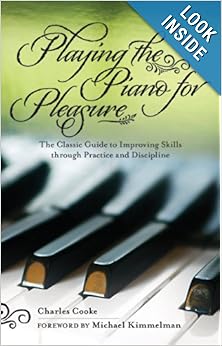My quote for Wednesdays with Words is from a book by Charles Cooke called Playing the Piano for Pleasure. I stumbled across this book at my library, and it is an absolute delight. The preface to the original edition (1941) begins: "This book is frankly intended as inspirational. In it I have tried to communicate my indelible enthusiasm for music-- in particular for the infinitely varied music that can be drawn from that noble, self-sufficient instrument, the piano." I feel this captures both the tone and the purpose of the book. If you play the piano as a hobby, or you used to play and would like to again, you will very likely find this book of great practical help. (I should mention that the focus is on Classical music.)
In his chapter titled "The Pleasant Necessity of Practicing," Cooke writes:
"Habit is a miraculous thing. To me it is more miraculous than nuclear radiation. From now on we are going to be working closely with Habit, piano playing being a complex of mental and physical habits. Therefore it behooves us to form right habits all along the line, and having formed them, to make them so intensely ours that they function unconsciously. When you substitute a good habit for a bad one, or when you decide to acquire a habit where none existed before, the new habit must function at first, for a little while, from power supplied by you. This is the stage where we have to make a strong conscious effort, even to the extent of a sensation of spiritual pain. But in a surprisingly short time the habit begins to take over the task of supplying power; it begins to develop its own momentum; and finally we get a sensation of spiritual pain if we don't exercise the habit....Hamlet, reasoning with his mother on the topic of dropping a bad habit and substituting a good one, said: 'For use almost can change the stamp of nature.' As far as piano playing is concerned, I take the liberty of differing with the Bard; I maintain that the word 'almost' could be omitted...Every day of our life, from now on, we will see proof that Habit is miraculous."Of course, I thought of Charlotte Mason and "Habit is ten natures" when I read this.
Click through to see what others are reading today!

